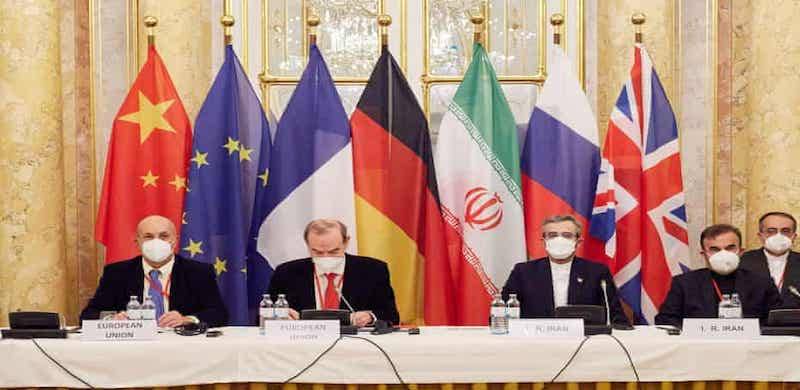
The eighth round of the Joint Comprehensive Plan of Action (JCPOA) will resume in the Austrian capital of Vienna tomorrow (Monday). Iran and the other signatories to the 2015 deal are once again working hard to get something out of these talks. Israel, along with many other countries of the region, is glued to the developing situation. Some of them are in favour of the resumption of the 2015 JCPOA agreement and some believe it’s a waste of time.
Will there be a deal? If there is a deal, who will benefit the most from it? If there is no deal, will Israel and the US attack Iran? What is going to happen in Middle East in the next few weeks? Such questions are currently being raised.
In the seventh round of talks in Vienna, Iranians took the position that sanctions imposed by the United States are inhumane, and no delegate in the dialogue disagreed with it. Everyone was of the opinion that sanctions hurt people. A threadbare discussion on Iranian uranium enrichment program also took place.
The nuclear facility in Karaj had become a sticking point between Iran and the IAEA. The agency claimed it had not been able to install replacement cameras at the workshop. A day later, an agreement was reached between the Iranians and the UN nuclear watchdog to address the concerns. Prior to this discussion, Iranians came up with two different drafts: one in which a plan to lift the sanctions altogether was written. Secondly, a plan to take actions on the Iranian nuclear program. These drafts came as a surprise to the European delegates for many reasons. However, they were accepted by the European camp for discussion. The working groups on nuclear program discussed the possibilities of reducing uranium enrichment on the other plants.
On the final day of the seventh round of talks, all the delegates decided to end the session with an agreement of returning to Vienna again with no specific date. Now amid winter breaks, two days after Christmas and three days before the New Year, the 8th round of talk will begin tomorrow (Monday) in Vienna.
Will there be an agreement? Let’s take a look at the main developments so far.
Let’s talk about Iran.
Will there be a deal? If there is a deal, who will benefit the most from it? If there is no deal, will Israel and the US attack Iran? What is going to happen in Middle East in the next few weeks? Such questions are currently being raised.
In the seventh round of talks in Vienna, Iranians took the position that sanctions imposed by the United States are inhumane, and no delegate in the dialogue disagreed with it. Everyone was of the opinion that sanctions hurt people. A threadbare discussion on Iranian uranium enrichment program also took place.
The nuclear facility in Karaj had become a sticking point between Iran and the IAEA. The agency claimed it had not been able to install replacement cameras at the workshop. A day later, an agreement was reached between the Iranians and the UN nuclear watchdog to address the concerns. Prior to this discussion, Iranians came up with two different drafts: one in which a plan to lift the sanctions altogether was written. Secondly, a plan to take actions on the Iranian nuclear program. These drafts came as a surprise to the European delegates for many reasons. However, they were accepted by the European camp for discussion. The working groups on nuclear program discussed the possibilities of reducing uranium enrichment on the other plants.
On the final day of the seventh round of talks, all the delegates decided to end the session with an agreement of returning to Vienna again with no specific date. Now amid winter breaks, two days after Christmas and three days before the New Year, the 8th round of talk will begin tomorrow (Monday) in Vienna.
Will there be an agreement? Let’s take a look at the main developments so far.
Let’s talk about Iran.
- A delegation of 40 members presenting two new drafts on the third day of the seventh round of talks show some seriousness and swiftness towards the deal; so the Iranians had shun the allegation of non-seriousness on them with these two drafts.
- Karaj facility was a sticking point between both camps, and Iran agreed to whatever was demanded by the watchdog. The seriousness was shown once again.
- From trade to life saving drugs, most of the things were hit hard by the sanctions; badly affecting their civilians. Even the COVID-19 vaccine was out of their reach. It was the US that unilaterally withdrew from the JCPOA agreement in 2018 and imposed sanctions on Iran, accusing the country of uranium enrichment without giving them a chance to clear themselves. Even the other European signatories were not taken into confidence. So the villain of this movie was then President Donald Trump and not Iran!
- Iran has also raised its concern successfully about Israeli aggression in the region -- referring not only to the indirect and direct attacks on them but also about the statements amid the seventh round of talks. Israel has vowed to attack Iran even if there is an agreement on resumption of JCPOA, neither respecting the agreement nor any of the participants. The question is: Why are other member countries silent on this aggression?
- The Iranians have also proved themselves as a power with which the strongest countries of the world have to sit and talk, even after the superpower betrayed them by withdrawing from the prior agreement unilaterally in 2018. When you cannot neutralise your enemy, talk!

